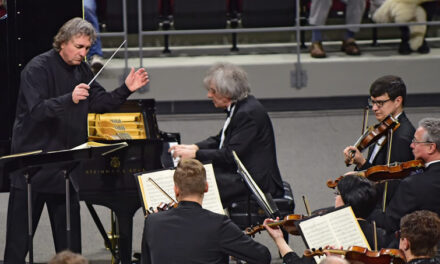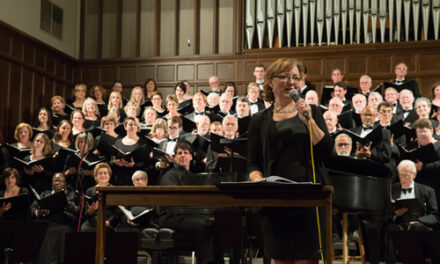MusicConnects is an education program of the Winston-Salem Symphony that seeks to bring people together through music. This was the concluding event of five lectures during the summer, held under this year’s theme of “Black Lives Matter.”
The theme of racial equity in the arts against the larger background of racial equality in America would on its own have made this talk of ample interest. The content presented here is even more exceptional. The lecture was devoted to the remarkable figure of Joseph de Bologne, also known as the Chevalier de St.-Georges (1745-1799). The Chevalier – a Black man born in the French colony of Guadelupe – was both one of the leading concert violinists AND swordsmen in France. “They are both in the wrist,” he said. At times he conducted leading orchestras in Paris, a major center of European musical culture, to high critical praise. He composed a substantial body of chamber music, symphonies concertantes, and operas which were performed in Paris at the time, often with him conducting, and which with recent investigation are considered of exceptional creative freshness. And if all that did not already mark a life of extraordinary accomplishment, he was the commander of the first Black regiment in European military history, the activities of which affected events in the years after the Revolution.
Despite all of the above, Joseph de Bologne has been all but written out of the music history books. And no two more passionate and articulate speakers for changing this disparity could have been found than those featured in this discussion: Dr. Quinton Morris and Bill Barclay.
Morris is a violin virtuoso, a performer and scholar of de Bologne’s music, filmmaker, and passionate community music advocate. To quote one item from the website information: “In 2014 he embarked on a two-year Breakthrough World Tour during which he performed, lectured, and taught in over 25 cities across five continents with an emphasis on providing education and musical materials to under-resourced communities. The tour also featured screenings of [his] short film The Breakthrough, which…tells a modernized story of the Chevalier [and] won the first place Diamond Award for Best Picture and Visual Effects in the European Independent Film Awards and the Bronze Award at the Global Music Awards in Los Angeles.”
Barclay spent seven years as the Director of Music at Shakespeare’s Globe Theatre in London. He produced the music for over 120 plays and 150 concerts, including his own original scores. He has credits on Broadway and London’s West End. His music has been heard in nearly 200 countries and he is the author of the recently published Shakespeare, Music, and Performance for Cambridge University Press. Furthermore, he is the creator of the play The Chevalier, which was to have been performed in Winston-Salem the night after the talk as part of the National Black Theatre Festival. That presentation has unfortunately been delayed until the spring of 2022 due to the resurging pandemic. However, the urgency and value of holding this discussion now were obvious.
The talk was introduced and moderated by Karen Ní Bhroin, the assistant conductor of the production. After reading out her opening material rather too quickly, she proved to be an insightful and effective discussion leader.
The dialogue presented aspects of de Bologne’s intriguing and eventful life, points of which are mentioned above. His unusual creativity received specific mention, such as his inventiveness with the symphonia concertante genre – very popular in Paris – which may have served as a model for Mozart. In addition, de Bologne’s tendency to have an unusual number of themes in the second section of a sonata form, wanting to emphasize the secondary key (partly for the fact, it was said, that things were done differently in Paris than in Vienna). De Bologne knew Mozart, as they lived together in Paris for a period of time, just after Mozart’s mother had died. De Bologne, the private music teacher to Queen Marie Antoinette, tried to find Mozart a job at Versailles, though it doesn’t seem to have worked out.
The complementary missions of the talk succeeded with eloquence and passion: to bring to wider public light a remarkable composer who, it can be reasonably assumed at least in part because of his Black origins, has largely disappeared from music’s historical record; to begin the process of bringing his music to be played, heard, and recognized as a part of the musical repertory; and in the bigger context, to normalize the presence of people of color – and women, for that matter – in our musical life and discourse. Morris and Barclay, joined by Bhroin, were superb advocates: eloquent, highly articulate, and persuasive. Their advocacy moves beyond tokenism, it was said, to the point where such music is simply part of what we normally hear and remains so. Morris spoke at one point about the presence of racism in his own musical life as the sole Black man studying at a well-known classical music institution. He aims to break down the hierarchical nature of the classical music world. One doesn’t have to view it as a line of best and less. “Have diverse friends,” he said, a theme picked up passionately by both of the other speakers.
A small point in the sometimes improvisatory flow was that nowhere were the dates of the chevalier’s life – given above – ever stated. Of course one could infer somewhat. But when de Bologne was referred to significantly as an elder mentor to Mozart, it would have helped to clearly see the 11-year age difference between them. Or it would have been good to know what was meant when it was briefly lamented how young he was when he died.
One can best hope that the public exposure begun here will continue, and that next spring The Chevalier will be brought to a rousing and sold-out performance success in Winston-Salem and then beyond.












